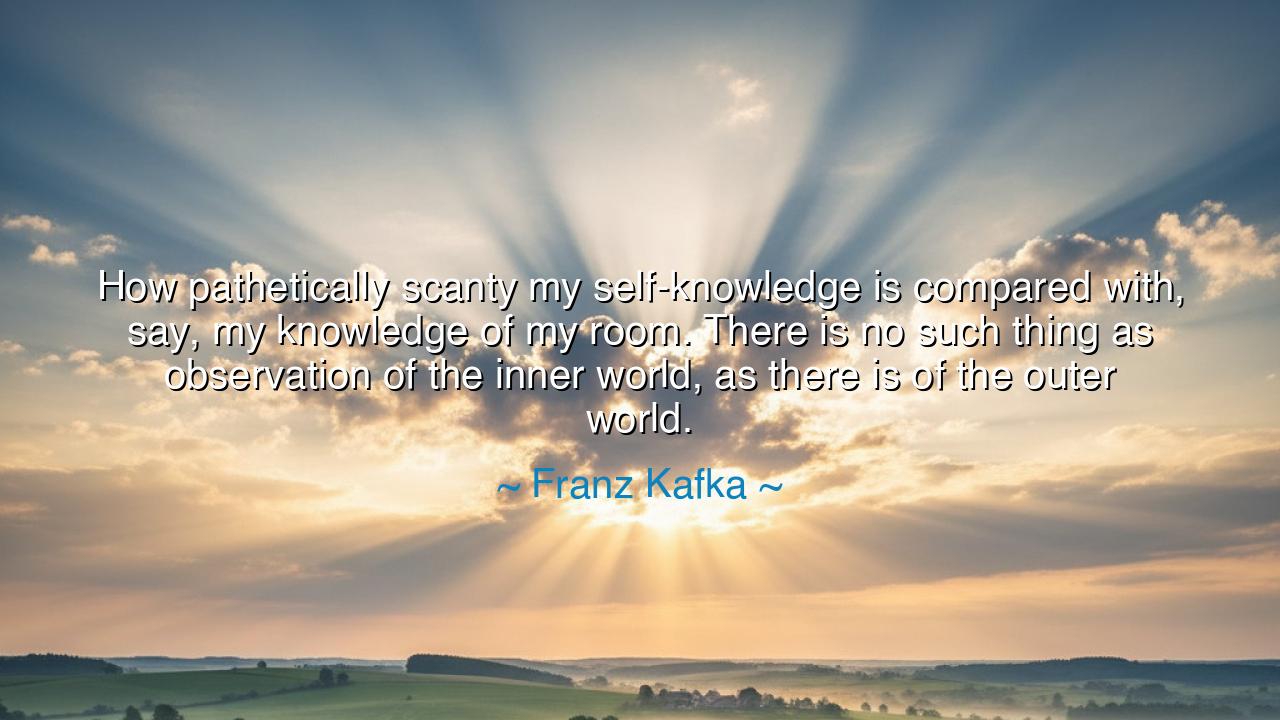
How pathetically scanty my self-knowledge is compared with, say
How pathetically scanty my self-knowledge is compared with, say, my knowledge of my room. There is no such thing as observation of the inner world, as there is of the outer world.






“How pathetically scanty my self-knowledge is compared with, say, my knowledge of my room. There is no such thing as observation of the inner world, as there is of the outer world.” – Franz Kafka
In this haunting confession, Franz Kafka, the poet of solitude and self-examination, lays bare the eternal struggle of the human spirit—to know itself. His words tremble with humility, yet they reveal a profound truth: that the inner world, the landscape of our thoughts, fears, and longings, remains more mysterious than the walls that surround us. We may describe every object in our room, every shadow and sound, yet when we turn our gaze inward, clarity fades into fog. Kafka, who spent his life plumbing the depths of his own consciousness, understood better than most that the mind is a labyrinth, and self-knowledge is a flickering candle barely lighting its corners.
The meaning of this quote lies in its paradox. Humanity has built telescopes to see the stars and microscopes to glimpse the invisible, yet it has no instrument to fully perceive the soul. We are masters of observation when it comes to the outer world, but clumsy wanderers within ourselves. To know the world is to measure, to map, to record. But to know the self requires surrender, honesty, and the courage to face what cannot be neatly labeled. Kafka calls our self-knowledge “pathetically scanty” not as an insult, but as a revelation—that the human being, for all its wisdom, remains the greatest mystery of all.
The origin of this thought can be traced to Kafka’s own life—a man who lived largely in the twilight between introspection and alienation. He filled journals with self-questioning, searching for some understanding of his fears, his guilt, his sense of isolation from the world. Yet the more he wrote, the less he seemed to know. His inner world was vast but undefined—a shifting ocean with no shore. His works, such as The Metamorphosis and The Trial, are reflections of this torment: the sense that man cannot even comprehend himself, let alone the forces that govern his destiny. He sought truth within, but found only layers of mirrors reflecting mirrors.
Consider the philosopher Socrates, who proclaimed, “Know thyself,” as the highest wisdom. Yet even he, the wisest of the Greeks, spent his life in questioning rather than answering. He understood that to know oneself is not to reach a destination but to walk a sacred path of inquiry. Socrates and Kafka, though centuries apart, shared the same agony and awe—the realization that the self resists full comprehension. Socrates faced his ignorance with serenity; Kafka with despair. But both taught that awareness of ignorance is itself a form of enlightenment.
Indeed, the inner world is unlike the outer because it cannot be seen from without. The eyes that observe cannot turn inward without distortion. Every thought we form about ourselves is already colored by pride, fear, or memory. Just as a mirror can never reflect itself, so too can the mind never grasp its totality. This is why the journey inward requires not sight, but insight; not logic, but humility. To observe the soul, one must accept its contradictions—to see that the darkness within is as natural as the light. Kafka’s lament is thus not hopelessness, but honesty—the first step toward any true awakening.
And yet, though the inner world eludes full observation, it is still the wellspring of meaning. To ignore it is to live like a stranger in one’s own home. Those who seek only the external—wealth, praise, possessions—may know their surroundings perfectly but remain exiled from their own hearts. The wise man does not flee from this difficulty; he dwells within it, learning through silence, through reflection, through the discipline of asking: “Who am I beneath my name, beneath my roles, beneath my fears?” The question may never find its final answer, but in the asking, the soul grows clearer.
The lesson, then, is this: do not despair at the limits of self-knowledge. Accept them as sacred boundaries, inviting you to go deeper. Sit quietly each day, not to judge yourself, but to listen—to the murmur of your thoughts, to the pulse of your desires, to the quiet voice that speaks beneath all noise. For though there is “no observation of the inner world” in the scientific sense, there is understanding born of stillness, compassion, and truthfulness. As Kafka teaches, the walls of your room may be easy to describe, but the chambers of your soul are infinite. And if you can learn to walk through them with patience and courage, you will discover that even in their mystery lies a kind of divine illumination.






AAdministratorAdministrator
Welcome, honored guests. Please leave a comment, we will respond soon